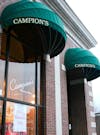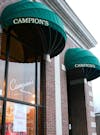
11.15.10.news.gelato

Use the fields below to perform an advanced search of The Dartmouth's archives. This will return articles, images, and multimedia relevant to your query.
1000 items found for your search. If no results were found please broaden your search.

11.15.10.news.gelato

11.10.10.news.breakfast_of_campions

11.10.10.news.breakfast_of_campions

The addition of musical numbers is one of many modern elements director Peter Hackett added to Shakespeare's text.

The addition of musical numbers is one of many modern elements director Peter Hackett added to Shakespeare's text.

11.15.10.sports.Volleyball1

11.15.10.sports.Volleyball1

11.15.10.sports.whockey

11.15.10.sports.whockey

11.15.10.sports.mhockey

11.15.10.sports.mhockey

11.15.10.sports.football

11.15.10.sports.football
The Tuck School of Business was ranked first in MBA employment rates for graduate business schools nationwide by Bloomberg Businessweek. Ninety-seven percent of graduates of the Tuck Class of 2010 reported job offers by three months after graduation, according to the article. Tuck officials attributed Tuck's success to administrators' anticipation of the effects of the financial crisis on firms' hiring practices and the implementation of programs to help students attract the attention of potential employers after graduation, according to a Tuck press release. As part of that effort, Tuck ensured that 100 percent of the class took part in internships in the summer of 2009. Both individual efforts by Tuck students and Dartmouth's strong alumni network were influential to the high employment rate, according to the release.
Due to naturally-occurring hormones found in dairy products, the consumption of milk may increase the likelihood of developing acne, according to an article authored by Dartmouth Medical School dermatology professor Bill Danby. The work, "Nutrition and Acne," was published in the most recent issue of Clinics in Dermatology, the official journal of the International Academy of Cosmetic Dermatology.
Gelato an Italian form of ice cream that is denser and lower in butterfat than its American counterpart has become an increasingly popular fad in the United States, according to Morano.
The current Campion's location has been open for 17 years, according to Valentine. The building will be put up for sale when the store closes.
A committee from the New England Association of Schools and Colleges will evaluate Dartmouth this week as part of a reaccreditation process held every 10 years. The team will evaluate the College's academic programs, faculty, students and physical resources, among other elements, to assess the quality of its undergraduate and graduate programs.
When most people see mold on a piece of bread or leftover fruit, the first inclination is to throw it away unless you're Cornell University's Department of Plant Pathology. The lab decided to turn the dreaded fungi into works of art by photographing their growth as they enveloped the food that they were feeding on. The time-lapse slideshows display a wide range of processes, from nature's most beautiful such as a caterpillar constructing a silk tent to its most disturbing including one of a potato (complete with a fork and knife for effect) rotting as bacteria feed on the soft skin and insides. Some are amusing, like one of Homer Simpson donning a fungus toupee in the style of a Chia Pet. Others are simply mesmerizing, including a fungus that develops as clear reflective crystals. Most of the photos were taken in short intervals, usually three to 10 minutes, in a span of a few days by Kent Loeffler, who runs the scientific photo lab at Cornell. Kudos to him for braving the smell and sight of rotting food.